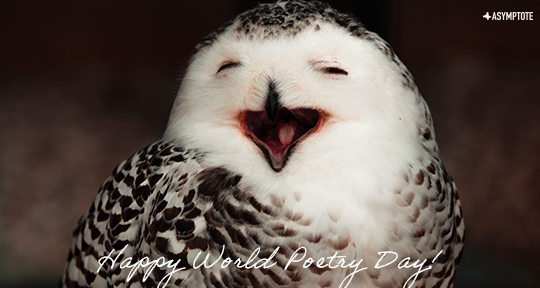In honor of World Poetry Day, we invite you to revisit some of the best international poetry from our eleven-year archive. For a start, Brazilian poet Lêdo Ivo’s work soars to great heights through its accumulation of brilliant specificities. But it also catches one unawares with looser, breath-taking lines like these: “Life itself is a round thing / so that when we go wrong, we go wrong roundly.” Revisit Lêdo Ivo’s “The Earth Is Round” from our Summer 2021 issue.
A leading light of South Korea’s contemporary poetry scene, Yi Won takes ‘avant-garde’ to new extremes. Catapulting the reader into a future where technology rules the human spirit, her lacerating social commentary interrogates the very nature of poetry itself. Courtesy of translator Kevin Michael Smith, discover Yi Won’s radical work from our Summer 2018 edition.
We might associate traditional poetic forms with conservative attitudes, but by remaining loyal to them, German poet Wolfgang Cordan’s poems allow “queerness to not only subvert the canon, but exist within it.” Don’t miss Klein Voorhees’s devastating translator’s note that turns a seemingly romantic poem into a downright sinister one. Revisit Wolfgang Cordan’s “Rememberance” from our Fall 2021 issue.
Oscillating between rage, acceptance, longing, and fear, award-winning Lebanese poet Etel Adnan’s atmospheric “October 27, 2003” is a revelatory meditation on coming to terms with existing within homelands old and new, chosen and imposed. Read her poem, translated with vigor by Sarah Riggs, from our Fall 2019 edition.
“A god of poetry died when Kosari died,” said Sherko Bekas upon the demise of the Poet Laureate of the Kurdistan Islamic Movement. Translated from the Kurdish-Sorani by Mohammed Fatih Mohammed and David Shook for our Winter 2020 issue, Khider Kosari’s rousing poetry has a singular vision: “We are the wave, the energy, and movement of a single flood.”
Last but not least, immerse yourself in the anguish and lyricism of the poetry written by Ukraine’s foundational poet Taras Shevchenko, translated by Daniel Moysaenko for our Spring 2018 edition, as it charts his life from serfdom to freedom to his later persecution and death. Then, check out the second installment of our latest column “We Stand With Ukraine,” featuring award-winning British poet Sam Garvan’s elegiac “To Memorise a Crocus.”
*****
Read more from the blog:






